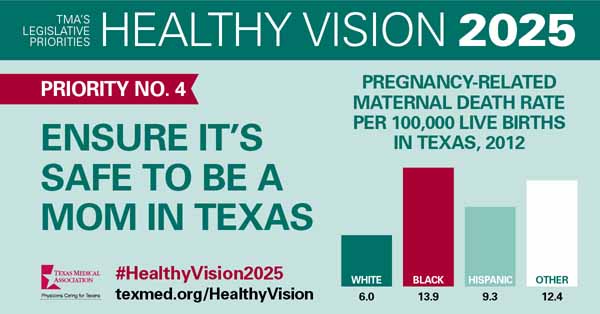
You, dear members, have been the highlight of my nearly 22 years here at the Texas Medical Association – working with you, getting to know you, seeing health care through your eyes. Quite frequently, those professional relationships turn into personal friendships, which I treasure.
Of course, with nearly 53,000 physician and medical student members at TMA, I’m always meeting and working with new ones – like Dallas obstetrician Eugene Hunt, MD.
 I’d never met Dr. Hunt, but reached out to him last year as we were writing Healthy Vision 2025, the latest edition of TMA’s advocacy blueprint. A major section of the document details our legislative plans to address Texas’ alarming increase in maternal morbidity and mortality. I wanted to include the story of a physician who had been through the trauma of losing a new mother post-partum. I got a tip to call Dr. Hunt.
I’d never met Dr. Hunt, but reached out to him last year as we were writing Healthy Vision 2025, the latest edition of TMA’s advocacy blueprint. A major section of the document details our legislative plans to address Texas’ alarming increase in maternal morbidity and mortality. I wanted to include the story of a physician who had been through the trauma of losing a new mother post-partum. I got a tip to call Dr. Hunt.
As a former newspaper reporter, I knew that sources frequently decline the invitation to recount sad stories. I also know that those stories, told with sufficient detail and authenticity, could be extraordinarily moving and effective.
I called and emailed Dr. Hunt with trepidation. I needn’t have. He was surprisingly open from the very beginning about two patients who had died – one just before going into labor, the other several weeks post-partum. We focused on the second case, in which a young mother had committed suicide after delivering her first child.
Over the course of two conversations, Dr. Hunt was quite frank and insightful as he explained the woman’s uneventful pregnancy and relatively uncomplicated post-partum, and the sudden and unexpected ending. He shared his roller-coaster emotional journey, the important changes he’s made in his practice as a result, and his zeal for every physician to screen every new mom for signs of post-partum depression.
I cried a bit while I interviewed Dr. Hunt – and a whole lot more as I listened to the recordings and wrote the story. Overall, I’m proud of the article, “It Didn’t Have to Be.” I think I captured the essence of Dr. Hunt’s story, the lessons he learned, and his passion for change.
What I failed to get across – what I guess I haven’t learned how to do in 35 years of writing – was the fear, the anger, the sadness, and the determination in Dr. Hunt’s voice. That’s what had moved me, but I feel as if I robbed my readers of the chance to experience all of that.
I’m sorry. I’ll do better next time.
Editor’s note: Our series on Healthy Vision 2025 continues next week with explorations of TMA’s advocacy agenda on the corporate practice of medicine, tort reform, scope of practice, and practice viability.
How can you get involved?